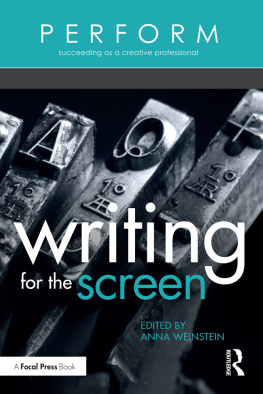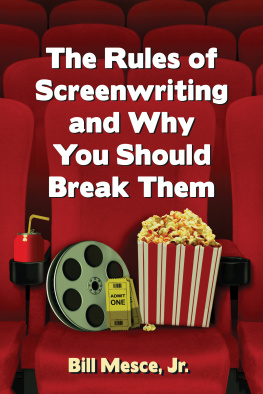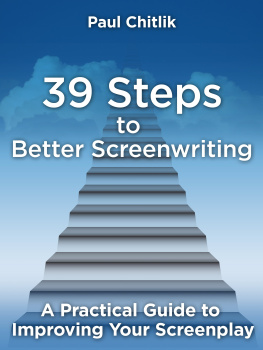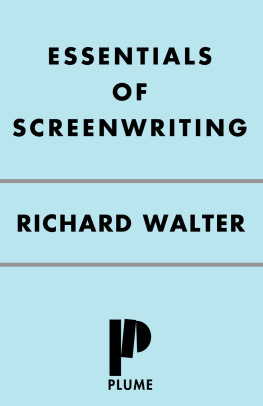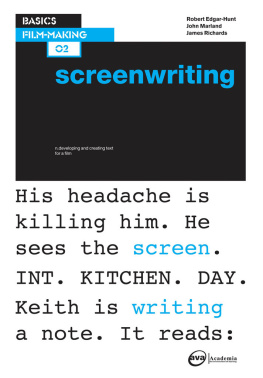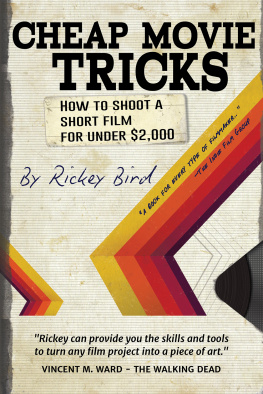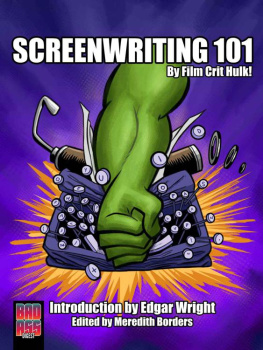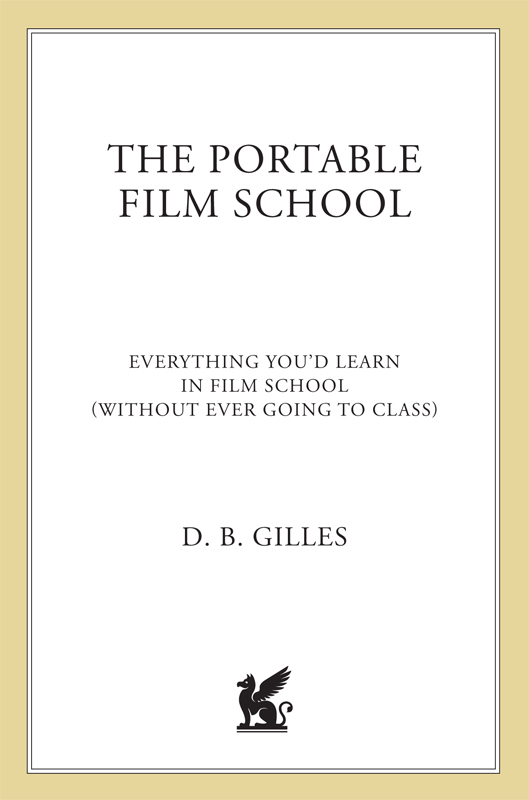
The author and publisher have provided this e-book to you for your personal use only. You may not make this e-book publicly available in any way. Copyright infringement is against the law. If you believe the copy of this e-book you are reading infringes on the authors copyright, please notify the publisher at: us.macmillanusa.com/piracy.
Contents
Part I:
Orientation:
Colloquium:
Part II:
Lecture 1:
Lecture 2:
Lecture 3:
Lecture 4:
Lecture 5:
Lecture 6:
Colloquium:
Part III:
Lecture 7:
Lecture 8:
Lecture 9:
Lecture 10:
Colloquium:
Part IV:
Lecture 11:
Colloquium:
Part V:
Lecture 12:
Colloquium:
Lecture 13:
Lecture 14:
Colloquium:
Lecture 15:
Lecture 16:
Lecture 17:
Lecture 18:
Lecture 19:
Part VI:
Lecture 20:
Lecture 21:
Lecture 22:
Colloquium:
Lecture 23:
Lecture 24:
Lecture 25:
Last Class:
For my mother,
Josephine Gilles
Very special thanks to
friend and filmmaker
Andrew Stoeckley
Acknowledgments
To my muse, Jane Campbell; my consigliere, Don DeMaio; and my script consultant, Sheldon Woodbury. To Nick Stevens for his wise counsel; my agent, Jane Dystel; my editor, Sheila Curry Oakes; and my copy editor, Barbara Wild.
Teaching in the Undergraduate Film and Television Department at New York Universitys Tisch School of the Arts has given me the privilege of working with enormously talented people. I want to thank all my colleagues, specifically David Irving, Lamar Sanders, Paul Thompson, Nick Tanis, James Gardner, Rick Litvin, Ezra Sacks, Peter Rea, Mo Ogrodnick, Dean Sheril Antonio, and Wendy Kaplan, for always answering my questions.
A big thanks also to my sister Kathy for always being there for me.
And to Lou Stalsworth and Sharon Schapow: getting it right this time.
Drama is life with the dull bits cut out.
ALFRED HITCHCOCK
Part I
Curriculum
Orientation
When Film School Isnt an Option
When you go to a university film school you start by learning how to tell stories. You move up to writing short screenplays and learning how to direct your scripts. The next step is writing a full-length screenplay.
What you will find within the covers of this book is a film school in a nutshell. Youll learn the fundamental skills and techniques of screenwriting and moviemaking. You will also learn how to make a short film without going broke in the process.
Like film students in formal programs youll begin by learning how to tell a story.
Then youll write a few short screenplays of between five and ten pages.
After that youll go through the process of producing and directing one of those scripts.
Last, youll move on to writing a full-length screenplay.
Your goal is to create a compelling film under ten minutes long to show off your abilities as a director and a full-length screenplay to demonstrate your skills as a writer.
Whatever your age, starting now, think of yourself as a student. Youre about to experience the next best thing to being in film school.
The best students are open to suggestion. You dont know what you dont know. Receive. Keep an open mind.
Youll work hard, but remember the old saying: The bitterness of studying is preferable to the bitterness of ignorance.
Once you learn how to do something well, you will no longer be a beginner. As you develop skills, youll move forward and keep getting better. Storytelling, filmmaking, and screenwriting are the skills that you will learn in The Portable Film School.
Once you understand them your goal is to master them. Much like an apprentice in the Middle Ages, youll learn by doing until you become a master.
Others have done it.
You can, too!
Colloquium
Why All Screenwriters Are Directors
The study of dramatic structure should start rigidly and advance to flexibility.
KENNETH THORPE ROWE
Half of the screenwriters Ive met have little or no interest in directing their screenplays. They simply want to write their script and hope that they get a deal and somebody else will direct it.
They think this way because they assume that all their creative energy should be channeled into their writing and that directing is some kind of mystical higher calling.
What these screenwriters dont realize is that when they sit down to write their screenplay theyre already directing it in their heads. Theyre acting it, too, probably saying the dialogue they write to themselves as it pours out.
By virtue of the fact that a screenwriter says
INT. KITCHENDAY
he has made a decision as to where the scene will take place. If the kitchen is that of a woman who is a gourmet cook, he might describe the kitchen like this:
INT. KITCHENDAY
State-of-the-art oven and refrigerator. Copper pots and pans hang from a ceiling rack. Numerous chef tools and gadgets. Elaborate spice rack filled with three dozen spices. Plenty of counter space. A window looks out onto a sprawling backyard where we see a garden of fresh herbs and vegetables. Two dozen cookbooks line one wall shelf.
Or
Lets say you decide that the person doesnt know how to cook, seldom uses her kitchen, and lives in a studio apartment. The description could easily read like this:
INT. KITCHENDAY
Tiny. Windowless. Neat. A small teakettle on the stove.
I could describe five or ten variations on a kitchen to create a sense of whose kitchen it is, to convey something (or several things) about the user of this kitchen, and each would be different and unique. How many kitchens have you been in? Have you ever seen two kitchens that looked (or smelled) alike? I havent.
So, depending upon how much the person Im writing about uses her kitchen, depending upon how important her kitchen is to her, depending upon what I want this womans kitchen to convey about herto make a visual statement about her (that shes a gourmet cook, that shes sloppy, that she likes gadgets, that she likes to wear aprons with funny sayings on them) I will describe the kitchen accordingly.
Not only am I writing the scene; Im also directing it. First in my head, then on the page.
Most screenwriting courses and books discourage the screenwriter from including camera angles and shots, largely because its assumed that the script will be directed by somebody else, so the screenwriter should allow the real director to determine where to place the camera to film each scene.
I agree with this thinking to a certain extent, but only from the point of view that filling a script with dozens upon dozens of camera angles and needlessly long stage directions is a surefire way to not get your script read.
However, to tell this particular story about this woman who likes to cook, its important to describe the kitchen in a specific way.
Heres why: Shes going to murder her husband. More about that in a bit.
The basic questions a director must deal with are where to put the camera and what to tell the actors.
As a screenwriter, you dont have to talk to actors or figure out whether to place the camera shooting upward, downward, or in a straight-on master shot. Thats literally the job of the director when the film is being shot. And if you turn out to be the one directing your screenplay, you will have to deal with that eventually.




